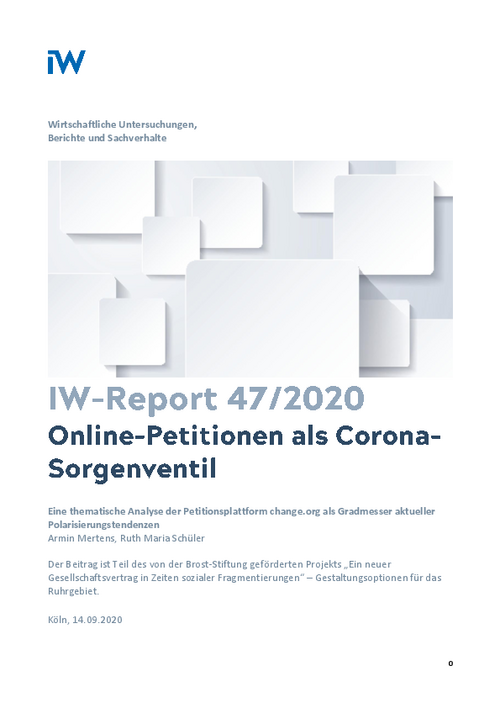The COVID-19 measures of the federal and state governments have at times massively affected public life in Germany. The ban on contact has temporarily restricted the freedom to pursue a profession, the freedom of trade, compulsory education and religious freedom.

Online Petitions as an Indicator of Current Polarization Tendencies
IW-Report

The COVID-19 measures of the federal and state governments have at times massively affected public life in Germany. The ban on contact has temporarily restricted the freedom to pursue a profession, the freedom of trade, compulsory education and religious freedom.
At the same time, the restriction of freedom of assembly reduced the opportunities for political participation to the digital realm. Against the background of these developments, Nida-Rümelin (2020) warns that the COVID-19 pandemic could prove to be an accelerator of the crisis in Western democracies. The extent to which digitisation strengthens or weakens democracy through additional forms of participation was already heavily debated before COVID-19. While Manow (2020), for example, sees digitisation as an opportunity for democracy, Pariser (2011) as well as Allcott and Gentzkow (2017) describe it as a threat to democracy.
An analysis of online petitions in the period before and during the COVID-19 measures in Germany shows that digital participation is used very strongly during the crisis. In March and April 2020 and therefore during the period of the most drastic decisions on COVID-19 virus containment, 3.3 million signatures were collected on petitions referring to the COVID-19 pandemic and related measures. Whether this is due solely to the issue of COVID-19 or to the contact restriction adopted on 22 March, which severely restricts other forms of political participation in the short term, cannot be clearly distinguished based on the data available. The analysis of the petitions' content suggests that the two aspects are interrelated. Nevertheless, it should be emphasized that in the current crisis, digital forms of participation offer an opportunity for German democracy to prove resilient.
During the COVID-19 pandemic, many people use petitions to express how the crisis affects their economic situation. This is reflected in over 1.35 million signatures for petitions addressing the economic dimension of the COVID-19 pandemic. At the same time, a large number of petitions has been submitted in response to decisions in education. However, these petitions are less frequently signed. The petitions, therefore, can be understood as a hint on the public opinion during the first COVID-19 lockdown.
For this study, almost 1,800 petitions of the commercial participation platform change.org are analysed. These petitions were put online from November 1, 2019 to June 2, 2020. We distinguish between decisions supporting and opposing the COVID-19 lockdown. This distinction shows that the announcement of school and daycare closures in the 12th calendar week is followed by a wave of calls for further measures to contain the pandemic. Shortly before the lockdown is loosened on 15 April 2020, the mood is tilting and a majority of petitioners are in favour of relaxing the lockdown. The call for more openness is increasing once again after the decisions of 15 April, only to slowly fade away with the further loosening of the lockdown.

Armin Mertens / Ruth Maria Schüler: Online-Petitionen als Corona-Sorgenventil – Eine thematische Analyse der Petitionsplattform change.org als Gradmesser aktueller Polarisierungstendenzen
IW-Report

More on the topic

Working with Long COVID: Impacts and Options for Work Arrangements
A SARS-CoV-2 infection can have long-term health consequences, a phenomenon commonly known as Long COVID, which often affect individuals of working age.
IW
Fertility Response to the COVID-19 Pandemic in Developed Countries: On Pre-pandemic Fertility Forecasts
The COVID-19 pandemic has affected all areas of our lives. Among other outcomes, the academic literature and popular media both discuss the potential effects of the pandemic on fertility. As fertility is an important determinant of population development and ...
IW